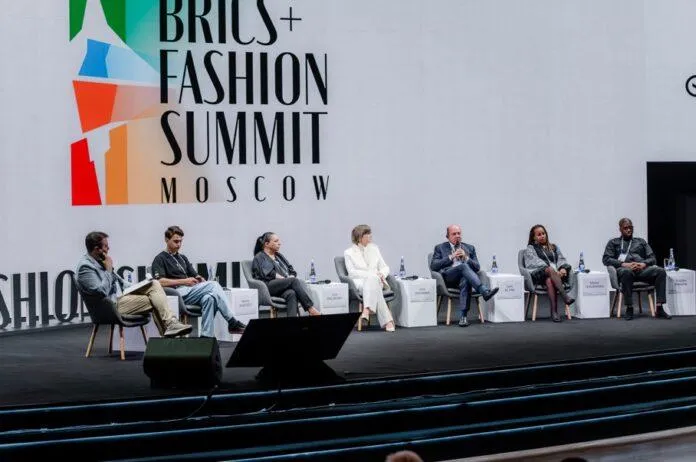Africa shapes fashion’s future at the BRICS+ Fashion Summit in Moscow
Talent Showcase

Far from the traditional Western fashion capitals, the BRICS+ Summit offered a new model — one rooted in decentralisation and democratisation, as highlighted by organisers.
Image: Supplied/BRICS+
AT THE end of August, Moscow hosted the BRICS+ Fashion Summit, the largest international fashion forum of its kind, uniting over 130 brands and delegates from more than 60 countries — including 15 African nations from Tunisia to South Africa.
Against a backdrop of global industry transformation, Africa emerged not just as a participant but as a dynamic, driving force reshaping the future of fashion.
Far from the traditional Western fashion capitals, the BRICS+ Summit offered a new model — one rooted in decentralisation and democratisation, as highlighted by organisers. It brought together designers, policymakers, and industry leaders from BRICS+ nations, Africa, Latin America, Southeast Asia, the Middle East, and Eastern Europe to forge collaborative pathways forward.
Africa’s fashion sector is on a powerful ascent. With textile exports currently at 2–3% of the global market — and climbing — countries such as South Africa, Ethiopia, and Kenya are leading the charge through quality craftsmanship, innovation, and sustainable practices. At the Summit, African voices were not only heard — they led critical conversations.
A landmark panel spotlighted how African designers are redefining global aesthetics by fusing heritage with modernity. Featuring luminaries such as:
- Mahlet Teklemariam (Founder, Hub of Africa Fashion Week, Ethiopia)
- Susan Sabet (Secretary General, Egyptian Fashion & Design Council)
- Mahlet Afework (Founder, Mafi Mafi, Ethiopia)
- Nana Tamakloe (CEO, Accra Fashion Week, Ghana)
- Mmantlha Sankoloba (CEO, Botswana Exporters & Manufacturers Association)
- Anis Montacer (President, Tunis Fashion Week)
The session explored how cultural authenticity, bold colour, and traditional materials are becoming Africa’s competitive edge.
Another key discussion focused on South Africa’s fashion renaissance, with insights from Soweto Fashion Week, the University of Johannesburg, Cape Town College of Fashion Design, and the Department of Sport, Arts and Culture. The message was clear: innovation, tech integration, and quality are propelling South African brands back onto the global stage.
Adding star power, celebrated designer David Tlale — a veteran of New York and Paris Fashion Weeks — unveiled his latest collection during Moscow Fashion Week, held in parallel with the Summit.
“My vision is that we move beyond conversations into action — collaborating, supporting, and uplifting each other,” said Tlale. “‘Proudly Made in South Africa by South Africans’ has always been our mantra. Through BRICS+, we can take that pride onto global stages with strength and unity.”
Susan Sabet echoed this sentiment: “BRICS+ exemplifies how large-scale, multicultural fashion forums can drive meaningful exchange. Fashion isn’t just clothing — it’s cultural diplomacy, identity, and economic empowerment.”
By centreing diverse voices and fostering South-South and East-West collaboration, the BRICS+ Fashion Summit is not just reflecting the future of fashion — it’s actively building it.